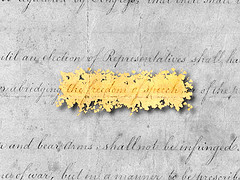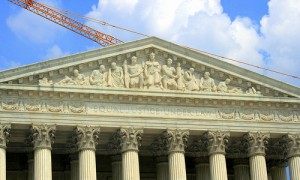High Court rejects student’s plea to reverse suspension

In 2004, Andres Osorio-Diez was killed in a motorcycle accident. He went to East Hampton High School in New York and was a classmate of Daniel DeFabio, a sophomore. A day or two after Andres died, David was overheard to say “one down, forty thousand to go” in reference to Andres’ ethnic background.
Remorse over the death of Andres turned to outrage when the comment spread around the school. Daniel denied making the statement, explaining that he only repeated what he heard another student say. In response to threats to kill Daniel and bomb his house, the principal called the police. They escorted Daniel off-campus and the principal told him to stay home for a few days for his own protection.
Daniel’s mother asked the principal to allow him to return to school and explain what happened or to read a statement at a school assembly. His request was denied. The principal thought that such a statement could further aggravate the tension. Following an investigation, Daniel was suspended for the remainder of the semester. He didn’t return to his school but finished high school in California. Additional appeals through the school system resulted in a decision from the state Board of Education annulling the suspension and clearing Daniel’s record.
Daniel and his mother filed a civil rights lawsuit claiming a violation of free speech by not letting him return to school and disavow the racial slur attributed to him.
Daniel lost at each level in federal court. The last court ruled against him citing the Tinker disruption standard. The court explained that schools can restrict student speech upon a reasonable forecast that it will cause “substantial disruption of or material interference with school activities.
Regarding Daniel’s situation, the court stated that there was no question that “Daniel’s mere presence in the school, with or without his speech, would likely result in violence”. On February 28, 2011, the U. S. Supreme Court declined to hear Daniel’s appeal. This leaves the lower court’s decision in place.
Should the school have allowed Daniel back to explain his comment to the student body? Do you think the school overreacted in sending him home? What other method could Daniel have used to get his message out that he didn’t originate the comment but merely repeated it? Assuming that was true, would it make a difference in the outcome? Why or why not?





Daniel should have backed down.
Not a doubt in my mind that Daniel was victimized by public opinion and suffered immensely as a result of his statement, but in the end his record was cleared by the State Board of Education…when he filed the lawsuit, he crossed the line.
Glad to see the federal court judges ruled correctly and denied Daniel’s claim.